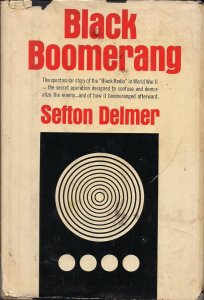Muriel Spark and the Ethics of Deception: a didactic approach to black propaganda
Beatriz Lopez finds traces of wartime moral dilemmas in Spark’s The Prime of Miss Jean Brodie
Following the closure of the PWE radio station Soldatensender in April 1945, Director of Special Operations Sefton Delmer retreated to his bathroom and performed a purification ritual to mark the end of black propaganda:
I removed my beard. […] After my razor shaved the soap sodden whiskers from my face I gazed into the mirror with all the horror of Dorian Grey [sic], confronting his tell-tale portrait. There, staring at me, was the pallid, flabby-mouthed face of a crook. Was this, I asked myself, what four years of ‘black’ had done to Denis Sefton Delmer?[1]

Despite his jocose and unsentimental tone when recollecting the harmful pranks played on enemy civilians as part of PWE campaigns, Delmer’s perceived resemblance to the depraved literary character Dorian Gray points to the existence of moral qualms about the nature of his wartime work. By contrast Spark’s account of her ‘wonderfully interesting’[2] intelligence role at the PWE does not present any pangs of conscience. While she notes that ‘[t]he methods of Delmer’s M.B unit horrified a few cabinet ministers’ – possibly referring to Stafford Cripps’s criticism of the occasional use of pornography in PWE propaganda to Germany – Spark acknowledges that her boss was the subject of much admiration (including her own).[3]
The question of whether the PWE’s ethically dubious methods were morally justified was the subject of much debate within the organization, as archival documents demonstrate. In a 1943 PWE lecture entitled ‘Political Warfare’, Col. Sedgwick adopts consequentialism – the belief that the rightness or wrongness of an action is to be determined by its intended consequences – in order to morally justify the use of black propaganda:
[A]s far as covert propaganda is concerned I will venture the purely personal opinion that it would be absurd to be squeamish. If by hitting the Germans below the belt we can shorten the war, and perhaps save a million lives I hope we shall be prepared to hit them below the belt every time…[4]

However, not all propagandists were of the same mind. In a 1962 review of Delmer’s Black Boomerang, Richard Crossman described black propaganda as ‘nihilistic in purpose and solely destructive in effect’ and expressed serious misgivings regarding ‘whether this decision to plunge far below the Nazis’ own level of lying, half-lying and news perversion was justified’.[5] This remark stems from Crossman’s belief that black propaganda was of little use when compared with the merits of BBC white propaganda.
Even among those who appreciated its value, there were still disagreements regarding the use of ‘the moral approach’ in PWE broadcasts. Noel Newsome, BBC Director of European Broadcasting, reacted against ‘those of our propagandists who urge us to […] eschew history, philosophy and religion in our broadcasts’ because ‘any propaganda which is not essentially moral must be colourless and empty’.[6] Others, such as PWE propagandist Robert Walsmley, were reluctant to blend the Allied cause with Christian ethics because they felt it ‘would nauseate listeners with our hypocrisy [and] would only produce the impression that we wanted to appear religious’.[7] Delmer eventually created a religious radio station, ‘Christ the King’, in which ‘Father Andreas’ (a pseudonym of genuine Austrian priest Father Elmar Eisenberger) attacked the anti-Christian values and the moral corruption of the Nazi regime.[8] Such involvement of a Catholic priest in black propaganda appears unconventional given the Christian commitment to natural law, which emphasises the duty of unconditional truthfulness.

Muriel Spark arguably found herself in a similar predicament given the discrepancy between her spiritual commitments, particularly in the light of her later conversion to Catholicism, and the consequentialist nature of PWE work. How did she reconcile the Christian view that ‘there are certain things forbidden whatever consequences threaten’ with the wartime need to weight the morality of actions according to their expected results?[9] And how can we reconcile often-proclaimed British values of freedom and democracy with the morally dubious methods of black propaganda?
Crossman’s 1952 address to the Royal United Service Institution (RUSI) offers an attempt to answer this question. Contrary to the traditional distinction between propaganda and education – ‘propaganda tells people what to think whereas education teaches people how to think’[10] – Crossman argues that successful propaganda exhibits a commitment to education:
The job of propaganda is […] to stimulate in people of the country thought for themselves, to make them begin to be, not cogs in a machine or units of a collective organization, but individuals. Individualism is the first act of disloyalty to a totalitarian government, and every individual who begins to feel he has a right to have a view is already committing an act of disloyalty…[11]

Reflecting on his WWII experience, Crossman suggests that totalitarian propaganda and democratic propaganda have divergent aims. While the former attempts to indoctrinate citizens into a set of beliefs, the latter aims to seep through the cracks of such discourse in order to cultivate doubt. Democratic propaganda may therefore fulfil a didactic role insofar as it is capable of eliciting distrust. Spark’s The Prime of Miss Jean Brodie (1961), a novel deeply concerned with the nature of education, illustrates Crossman’s claim. Through the figure of school pupil Sandy Stranger, Spark allows the reader to partake in the structural movement from unwavering loyalty to outright suspicion of Miss Brodie. Sandy’s initial belief that Miss Brodie’s behaviour was ‘outside the context of right and wrong’ is questioned both by her unapologetic encouragement of a student to fight for Franco and her insistence in involving Rose, one of her students, as a proxy for herself in an affair with the art master.[12]
Moreover, Miss Brodie’s imposition of her imaginary fancies onto the girls backfires when Sandy takes Rose’s place in the affair, thus leading Sandy to question her previously taken-for-granted role as ‘the God of Calvin [who] sees the beginning and the end.’[13] Spark’s novelistic method thus resembles that of PWE propagandists, since her introduction of disruptive events leads Sandy to suspect, and ultimately betray, her teacher on the grounds that she is teaching fascism. In doing so, Sandy escapes the authoritarian influence of Miss Brodie and prompts her teacher’s dismissal from the school, but whether Sandy’s betrayal stems from moral duty or personal self-interest remains unclear.
Sandy later embraces Catholicism, a religion ‘in whose ranks she had found quite a number of Fascists much less agreeable than Miss Brodie’, and becomes Sister Helena of the Transfiguration.[14] At this stage, Sandy shows an apologetic attitude towards Miss Brodie, who she describes as ‘quite an innocent in her way’, and her own representation as ‘clutching the bars of the grille’ insinuates a certain degree of regret about her less than altruistic betrayal of Miss Brodie.[15] Did Sandy betray Miss Brodie out of moral duty or envy? Spark never goes in for motives, but in exposing a lively and charismatic teacher as a source of evil, The Prime of Miss Jean Brodie testifies to Spark’s fascination with the ethics of deception.
Follow Beatriz Lopez at @bealoplop
Notes
[1] Sefton Delmer, Black Boomerang: An Autobiography: Volume Two (London: Secker & Warburg, 1962), 217-8.
[2] Muriel Spark, Curriculum Vitae: A Volume of Autobiography (Manchester: Carcanet, 2009; originally published 1992), 147.
[3] Spark, Curriculum Vitae, 148.
[4]FO 898/99.
[5] R. H. S. Crossman, ‘Black Prima Donna’ (Review of D. Sefton Delmer, Black Boomerang), New Statesman, 9 November 1962, 676–7, 677.
[6] FO 898/181.
[7] FO 898/177.
[8] Sefton Delmer, Black Boomerang, 121-3. Lee Richards, The Black Art: British Clandestine Psychological Warfare against the Third Reich (Peacehaven: Psywar, 2010), 210.
[9] G. E. M. Anscombe, ‘Modern Moral Philosophy’, Philosophy 33.124 (1958): 1-19, 10.
[10] Philip M. Taylor, Munitions of the Mind: A History of Propaganda from the Ancient World to the Present Day (Manchester: Manchester University Press, 2003), 14.
[11] Richard Crossman, ‘The Creed of a Modern Propagandist’, in A Psychological Warfare Casebook (ed. William Daugherty) (Baltimore, MD: Johns Hopkins University Press, 1958), 35-47, 40.
[12] Spark, The Prime of Miss Jean Brodie (Edinburgh: Polygon, 2018), 85.
[13] Ibid., 121.
[14] Ibid., 126.
[15] Ibid., 128.
